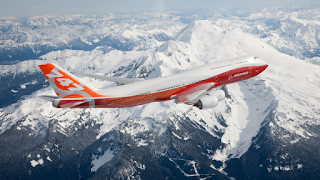Previously, I wrote about Airbus A380's emergence as an icon for international long haul air travel. While Boeing 747 has long been known as the 'Queen of the Skies', advances of technology and consumer and industry wide preference for point-to-point, thinner routes meant even planes as big as Airbus A380 may not be able to rule the sky - in big numbers for years to come.
The sales of Boeing 747 is partly hampered by advances in technology that enable smaller, more efficient planes to fly as far and as dense as the iconic jet. -Source-
Sales of Boeing's latest 747, the -8 series has been flagging. A latest order of 18 units of this iconic jet was announced back in June 2015 by Volga-Dnepr Group, a Russian based freighter company. The company is best known as a major operator of Antonov AN-124-100 Ruslan planes, the largest jet engine aircraft in the world (Yes, certainly bigger than A380 though it is used exclusively for non-human cargo).
Boeing Co. said that the order will extend the life of 747 program to year 2022. By that time, Boeing will also schedule to produce the newest version of Boeing 777, which now currently being marketed as Boeing 777X. With a flying range of more than 8,500 nautical miles and seats up to 400 passengers (and more depending on airlines) - all with using two engines, Boeing 777 certainly has become a favourite and will be a favourite for major airlines.
And the Boeing 747? - It is a plane designed in the 1960s where quad power plants were still needed to ensure reliability of long haul transoceanic flights. Over the years, as technology improves, subsequent models have become leaner and two engines has become more standard for long haul, 14-16 hours non-stop flight. As symbolic it may be, I think the iconic Jumbo Jet may still be around, but only used ones. When? I don't know.

No comments:
Post a Comment